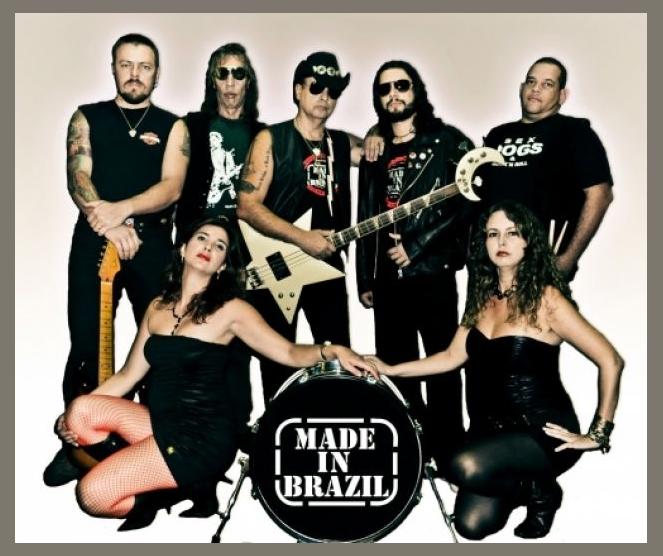 Made In Brazil
Made In Brazil
Made In Brazil: The Epitome of Brazilian Rock 'n' Roll
Origins and Rise to Stardom
Hailing from the vibrant city of Rio de Janeiro, Made In Brazil emerged on the music scene in 1985. Led by the charismatic vocalist Nando Reis, the band quickly gained a loyal following with their infectious melodies and energetic live performances. Their debut album, "Músicas para Ouvir no Banheiro," propelled them to national fame and established them as one of the leading forces in Brazilian rock music.
Signature Sound and Lyrical Depth
Made In Brazil's music is characterized by a fusion of hard-driving rock 'n' roll with elements of blues and folk. Their lyrics, penned primarily by Reis, explore themes of love, loss, social issues, and the human condition. With a raw and poetic style, Reis's words resonated deeply with audiences and cemented the band's reputation as lyricists of exceptional depth.
Challenges and Controversies
Despite their widespread success, Made In Brazil faced their share of adversity. In 1995, Reis left the band to pursue a solo career, leaving a significant void in the group. The departure of their iconic frontman led to a period of uncertainty and lineup changes. However, the band persevered, recruiting new members and continuing to release music that resonated with fans.
Discography and Acclaim
Over the course of their career, Made In Brazil has released numerous critically acclaimed albums, including "Românticos Anônimos" (1996), "Filhos da Resistência" (1999), and "A Vida Que Pedi" (2006). The band's music has earned them numerous awards, including several Latin Grammys, and has cemented their place as one of the most influential rock bands in Brazil.
Members and Legacy
The current lineup of Made In Brazil consists of:
* Xande Pinheiro (vocals)
* Hugo Faria (guitar)
* Fábio Russo (bass)
* Oswaldo Dauro Jr. (drums)
The band's enduring legacy lies in their ability to connect with audiences on a profound level through their powerful music and thought-provoking lyrics. Made In Brazil continues to inspire generations of Brazilian musicians and serves as an enduring symbol of the vitality and diversity of Brazilian rock 'n' roll.
Origins and Rise to Stardom
Hailing from the vibrant city of Rio de Janeiro, Made In Brazil emerged on the music scene in 1985. Led by the charismatic vocalist Nando Reis, the band quickly gained a loyal following with their infectious melodies and energetic live performances. Their debut album, "Músicas para Ouvir no Banheiro," propelled them to national fame and established them as one of the leading forces in Brazilian rock music.
Signature Sound and Lyrical Depth
Made In Brazil's music is characterized by a fusion of hard-driving rock 'n' roll with elements of blues and folk. Their lyrics, penned primarily by Reis, explore themes of love, loss, social issues, and the human condition. With a raw and poetic style, Reis's words resonated deeply with audiences and cemented the band's reputation as lyricists of exceptional depth.
Challenges and Controversies
Despite their widespread success, Made In Brazil faced their share of adversity. In 1995, Reis left the band to pursue a solo career, leaving a significant void in the group. The departure of their iconic frontman led to a period of uncertainty and lineup changes. However, the band persevered, recruiting new members and continuing to release music that resonated with fans.
Discography and Acclaim
Over the course of their career, Made In Brazil has released numerous critically acclaimed albums, including "Românticos Anônimos" (1996), "Filhos da Resistência" (1999), and "A Vida Que Pedi" (2006). The band's music has earned them numerous awards, including several Latin Grammys, and has cemented their place as one of the most influential rock bands in Brazil.
Members and Legacy
The current lineup of Made In Brazil consists of:
* Xande Pinheiro (vocals)
* Hugo Faria (guitar)
* Fábio Russo (bass)
* Oswaldo Dauro Jr. (drums)
The band's enduring legacy lies in their ability to connect with audiences on a profound level through their powerful music and thought-provoking lyrics. Made In Brazil continues to inspire generations of Brazilian musicians and serves as an enduring symbol of the vitality and diversity of Brazilian rock 'n' roll.